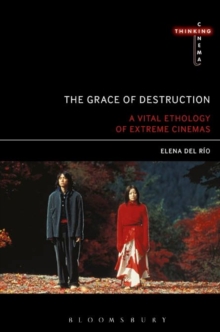Description
| Product ID: | 9781501303029 |
| Product Form: | Hardback |
| Country of Manufacture: | GB |
| Series: | Thinking Cinema |
| Title: | The Grace of Destruction |
| Subtitle: | A Vital Ethology of Extreme Cinemas |
| Authors: | Author: Elena del Rio |
| Page Count: | 288 |
| Subjects: | Film history, theory or criticism, Film theory & criticism |
| Description: | Select Guide Rating For Elena del Río, extreme cinema is not only qualitatively different from the representations of violence we encounter in popular, mainstream cinema; it also constitutes a critique of the socio-moral system that produces (in every sense of the word) such violence. Drawing inspiration from Deleuze’s ethics of immanence, Spinoza’s ethology of passions and Nietzsche’s typology of forces, The Grace of Destruction examines the affective extremities common in much of global, contemporary cinema from the affirmative perspective of vital forces and situations—extremities such as moral/religious oppression, biopolitical violence, the pain involved in gender relations, the event of death and planetary extinction. Her analysis diverges from the current literature on extreme cinema through its selection of films, which include key international examples, and through its foregrounding of relational, affective politics over representations of sexuality and graphic violence. Detailed formal and philosophical analyses of films like The White Ribbon, Dogville, Code Unknown, Battle in Heaven, Sonatine, Fireworks, Dolls, Takeshis’, Inland Empire and Melancholia are meant to move us away from the moral appraisal of violence and destruction, and to compose an ethological philosophy of cinema based on Deleuze’s idea that, “when truth and judgment crumble, there remain bodies, which are… nothing but forces.” For Elena del Río, extreme cinema is not only qualitatively different from the representations of violence we encounter in popular, mainstream cinema; it also constitutes a critique of the socio-moral system that produces (in every sense of the word) such violence. Drawing inspiration from Deleuze’s ethics of immanence, Spinoza’s ethology of passions and Nietzsche’s typology of forces, The Grace of Destruction examines the affective extremities common in much of global, contemporary cinema from the affirmative perspective of vital forces and situations—extremities such as moral/religious oppression, biopolitical violence, the pain involved in gender relations, the event of death and planetary extinction. Her analysis diverges from the current literature on extreme cinema through its selection of films, which include key international examples, and through its foregrounding of relational, affective politics over representations of sexuality and graphic violence. Detailed formal and philosophical analyses of films like The White Ribbon, Dogville, Code Unknown, Battle in Heaven, Sonatine, Fireworks, Dolls, Takeshis’, Inland Empire and Melancholia are meant to move us away from the moral appraisal of violence and destruction, and to compose an ethological philosophy of cinema based on Deleuze’s idea that, “when truth and judgment crumble, there remain bodies, which are… nothing but forces.” |
| Imprint Name: | Bloomsbury Academic USA |
| Publisher Name: | Bloomsbury Publishing Plc |
| Country of Publication: | GB |
| Publishing Date: | 2016-05-05 |


